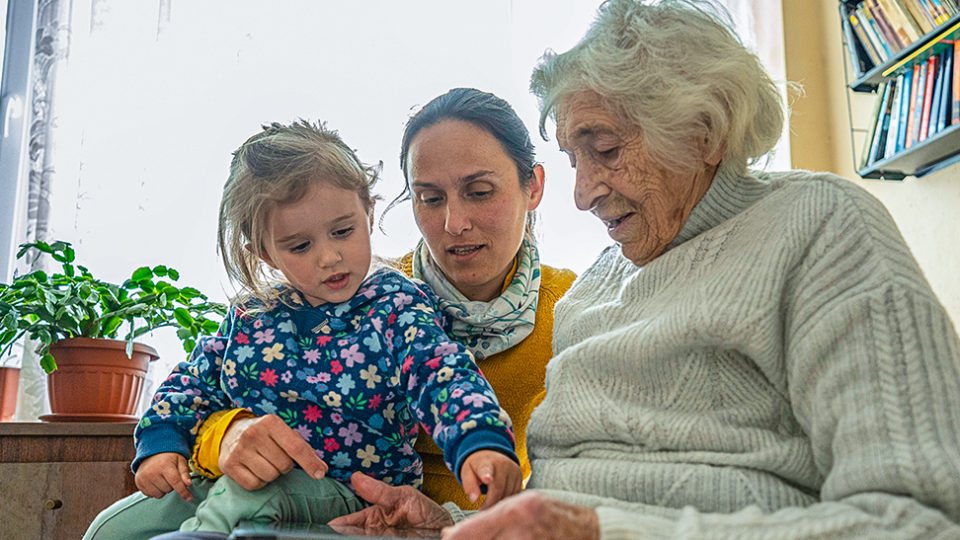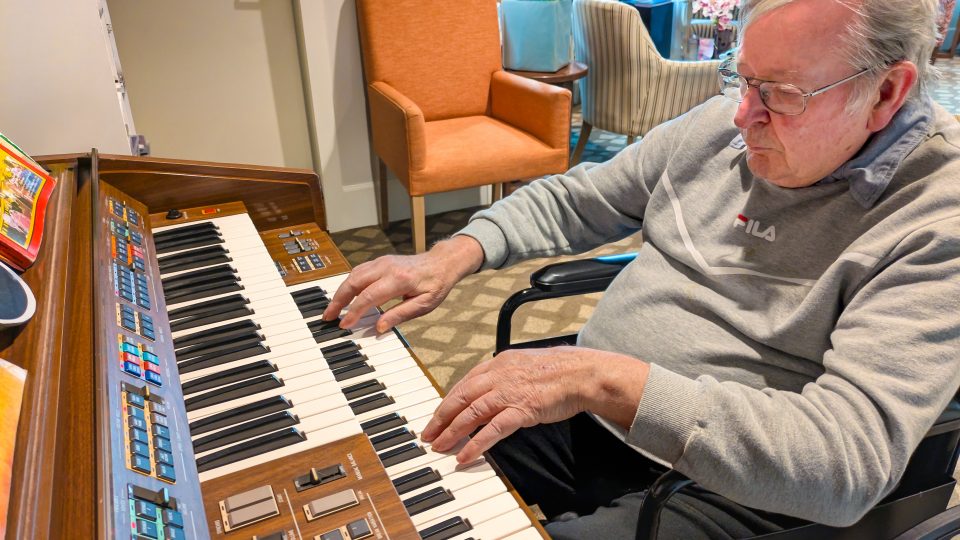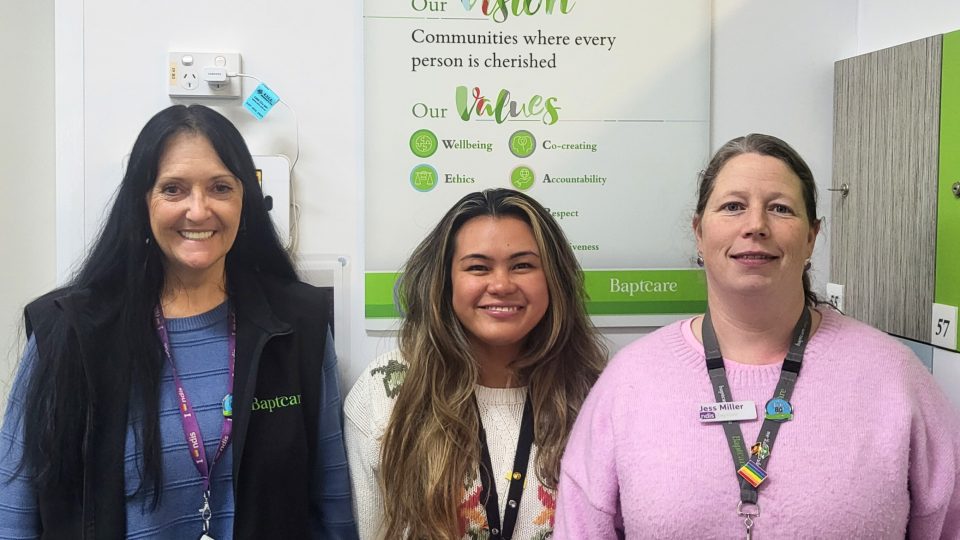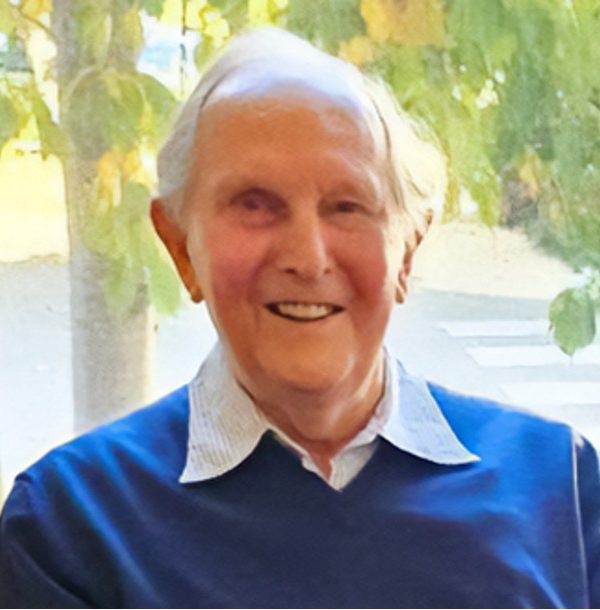This is what 102 years old can look like:
Engaged. Witty. Wise. Alive. But more than anything else, humble.
Meet Durham Smith. At 102 years of age, Durham is a long time (and much-loved) resident at Baptcare Hedley Sutton Retirement Living.
As is often the case with highly accomplished and impressive people, Durham humbly deflects all personal attention. So, in this article, we won’t focus on his life story (including his AO), although you can read about his incredible medical career on the Royal Children’s Hospital alumni pages here.
Instead, we’ll share Durham’s thoughts on retirement, living and what life looks like when the two are combined at Baptcare’s Hedley Sutton Retirement Living community.
How long have you been a part of Hedley Sutton’s Retirement Living community?
Fourteen years.
And what would you say to people who may be thinking of making the transition to retirement living but are a bit hesitant?
I’d start by saying that it is definitely a big mental challenge to take the leap and move into a retirement community.
But I would also say that it’s one of the best things you could possibly do.
What about the concern people may have that they will need to change their current lifestyle?
If you are fit and well, you can continue with all your friendships and associations. I’ve had continued freedom of life since coming here to Hedley Sutton. It’s not a prison here!
When I moved here, I was able to keep all the things I was interested in – sporting friends, alumni groups, music outings and church friends.
You sound as though you’ve lived – and continue to live – a very full life, Durham. At 102 years young, any tips for living well?
As a generalisation, as long as you have the ability to work, then keep going. But when that period is over and you retire, take up an interest in sport or art or whatever will keep your mind and body active.
Be curious about things. You can discover new interests, even at 102! For example, recently I’ve learnt about the world of antique furniture. I’m also learning to look more deeply into art and literature.
One of the books I’ve read recently is Charles Dickens’ classic Great Expectations. As a school kid I was bored to tears reading literature, but now I can listen to an audio book and get joy from the words, the images created and the structure of the sentences.
I wouldn’t have expected that I would immerse myself in other worlds like literature and antiques in my later life, but I have.
What is the most important thing you have learned about life?!
That life is for living!
You have to keep on engaging with life – you need to get out of your chair and make things happen.
Keep going with as many interests as you can and make an effort to mix with other people too.
Watching the easy interactions you have with your neighbours here at Hedley Sutton, it seems an easy place to socialise.
Yes, it is. The main bonus of Hedley Sutton is its small size, with only about 30 other residents here. This small size means that it feels like a community and you get to develop deep friendships. It’s a beautiful thing to live with that.
As you get older, you do fewer things externally because it can be logistically harder to get around. Therefore, you need more friends within the Retirement Living community. It’s so wonderful to have friends so close by when your own life may be getting more restricted with age.
I regularly have coffee with some of the other residents in the mornings and afternoons, and we get to talk about lots of things. It’s congenial and harmonious. In the 14 years that I’ve lived at Hedley there hasn’t been any conflict.
It should be said though, there are other folk who prefer their own space and time, and that is fine here. Everyone is supported in the kind of life they wish to live.
And whoever we are, we always feel safe and cared for, because there is always a member of staff on duty, and that means twenty-four hours a day.
(Ed. Re: the community comment by Durham: There was an alarm drill while Comms was visiting and a few of Durham’s neighbours converged onto the landing outside their rooms to investigate, greeting each other warmly, obviously delighted to see each other.)
Have you any further thoughts on living at Hedley Sutton as a Baptcare community?
I am very happy with the motivation of Baptcare – it’s authentic. Baptcare genuinely strives to care for people. Baptcare really means it when they say they care.
I’d also say that the leadership here is exceptional. The management staff of Hedley Sutton have a remarkable insight into the mindset of retired people. Mary and Tanja – remarkable women both technically and also with their care. Every decision they make is determined by how it will affect the individuals, and motivated by making the best decision to make the residents’ lives easier.
Your energy is amazing, Durham. You really do make 102 look good. What’s your motto in life?
Life is to be lived. Keep curious. Keep asking questions and keep immersing yourself in something that stirs your mind. It’s so important to keep the mental side active as it will keep you going. As for physical health, you need to try and keep moving, but really, I’m alive purely by technology! I’ve got two stents, a heart valve and a pacemaker keeping me going at the moment.
Not to mention your unique, infectious spirit, Durham, something that not even the most advanced technology could mimic. Thank you for everything you bring to Baptcare life. We’re so lucky having you as part of our community.
Community news
-

The sandwich generation phenomenon unpacked
Welcome to the first of two blogs on the theme of the sandwich generation in Australia. In this one, we’ll cover the definition of the sandwich generation, the different types of caring that fall within it and some of the issues those in the sandwich generation face. The second blog will cover tips for dealing with life in the sandwich generation
- 02 Jul 2025
-

Wyndham Lodge Choir
Every Tuesday afternoon, residents gather in the sunny music room at Baptcare’s Wyndham Lodge Residential Aged Care community to sing together.
- 25 Jun 2025
-

The Green Team at Moonah Hub
The Sustainability Team, known as ‘The Green Team’, are based at Baptcare Moonah Hub in Hobart and are all about promoting environmentally friendly and sustainable practices in their office, the wider organisation and the local community. We asked Jess Miller, their enthusiastic and determined leader, all about the team and what they do. Read more below!
- 11 Jun 2025

